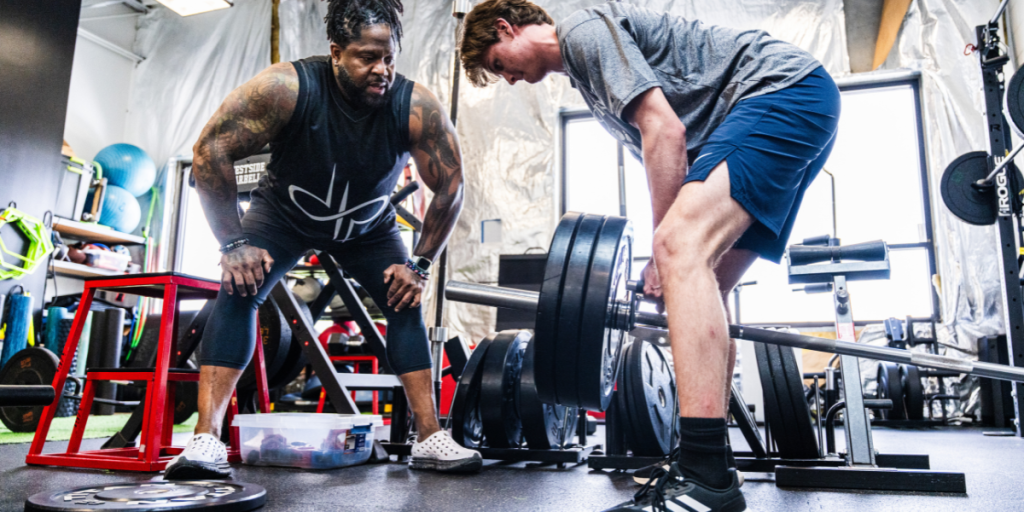You have heard that sleep is vital, but what is the importance of sleep in athletic recovery?
Often, athletes of all ages overlook the impact of sleep on their performance and recovery. Inadequate sleep can lead to increased sleep debt and disrupt the body’s natural rhythm, affecting everything from memory consolidation to muscle recovery.
In this article, the Infinite Performance Training team will explore why sleep is crucial for athletes and how it enhances performance recovery. It will also provide practical tips for improving your sleep quality.
First, Why is Sleep Important for Athletes?

Sleep is vital in athletic recovery and muscle repair, influencing overall performance. Adequate sleep enhances mood, reduces the risk factor for injuries, and strengthens the immune system, lowering the chances of common colds. Understanding the dynamics of sleep onset and incorporating practices like meditation can significantly impact athletes’ recovery strategies.
The Impact of Sleep on Recovery and Muscle Repair
Sleep significantly impacts recovery and muscle repair for athletes like you. By facilitating essential physiological processes, your body repairs itself when you sleep. During sleep, your body releases growth hormone, which is crucial for muscle growth and repair. Adequate rest helps maintain homeostasis by regulating blood pressure and promoting effective recovery from intense training sessions, allowing athletes to perform at their best.
Noisy environments can disrupt sleep quality, hindering recovery and performance. Athletes must prioritize sleep hygiene, ensuring a quiet, dark space to promote uninterrupted rest. By prioritizing these factors, they can optimize muscle recovery and enhance overall athletic performance:
| Factor | Impact on Recovery |
|---|---|
| Growth Hormone | Essential for muscle repair and growth |
| Blood Pressure Regulation | Helps maintain cardiovascular health during recovery |
| Sleep Environment | Influences sleep quality and recovery rates |
Sleep shapes the body and mind of an athlete. In understanding its role, one can see how it fuels performance recovery.
How Does Sleep Influence Performance Recovery?

Sleep duration directly influences athletic output, affecting tissue recovery and overall performance. Adequate rest is crucial in reducing injury risk by lowering inflammation and mitigating the effects of overtraining. This section delves into the vital connection between sleep and exercise physiology, highlighting how quality rest enhances recovery and optimizes athletic capabilities.
1. Sleep Duration and Its Effect on Athletic Output
Sleep duration plays a significant role in athletic output by providing the energy needed for optimal performance. Insufficient sleep can impair the function of the pituitary gland, which is responsible for releasing hormones that promote growth and repair. Athletes who prioritize adequate rest are better equipped to adapt to training demands and experience improved muscle recovery, enhancing overall performance.
Research utilizing actigraphy, a method of monitoring sleep patterns and efficiency, shows that increased sleep duration correlates with better performance outcomes in athletes. Ensuring high sleep efficiency—achieving restorative sleep without interruptions—can lead to reduced fatigue and improved focus during competitions. Consequently, athletes striving for peak performance must understand the interplay between sleep duration and their physical capabilities:
| Aspect | Impact on Output |
|---|---|
| Energy Levels | Directly boosts performance capabilities |
| Pituitary Gland Function | Affects hormone production for recovery |
| Actigraphy Insights | Helps monitor and assess sleep patterns |
| Adaptation to Training | Enhances physical and mental responsiveness |
| Sleep Efficiency | Promotes better recovery and focus |
2. Reducing Injury Risk
Sleep directly influences the body’s physiology, playing a critical role in reducing the risks of injury in athletes. Sufficient rest aids in managing pain levels and alleviates physical pressure by promoting recovery in muscles and connective tissues. By allowing the body to undergo essential metabolic processes during sleep, athletes can better prepare for challenging physical demands, ultimately leading to enhanced performance and reduced susceptibility to injuries.
Inadequate sleep can increase the likelihood of injuries due to fatigue and decreased mental focus, which impacts decision-making during physical activities. Athletes who prioritize restorative sleep demonstrate improved attention, coordination, and response times, mitigating the risks associated with overtraining and poor recovery. Understanding the importance of sleep not only helps athletes manage their bodies effectively but also leads to better long-term health outcomes by minimizing injury-related setbacks.
Rest is not just for dreaming; it is the body’s quiet work. Understanding how this stillness fuels recovery reveals the deeper ties between sleep and performance.
GET IN TOUCH
Schedule a Training Session
Sleep Quality and Inflammation
The connection between sleep quality and inflammation has garnered attention in recent studies, highlighting the prevalence of inflammatory responses in athletes experiencing insufficient rest. High-quality sleep activates the parasympathetic nervous system, promoting recovery and reducing markers of inflammation, which can otherwise hinder performance. Physicians and researchers emphasize that athletes should prioritize restful sleep to modulate inflammatory responses, ultimately enhancing their physical capabilities and recovery times.
Evidence suggests that poor sleep may lead to heightened levels of sleep inertia, resulting in decreased alertness and increased likelihood of injury. Athletes who consistently obtain restorative sleep can mitigate inflammation, thus fostering better muscle recovery and overall performance. By understanding these mechanisms, athletes can adopt strategies to improve their sleep environment, ensuring they are prepared to meet the demands of training and competition.
Strategies for Improving Sleep Quality Among Athletes

Establishing a consistent sleep routine is essential for athletes seeking to optimize recovery and performance. This means adhering to a regular sleep schedule, which can help reduce stress and regulate heart rate. Creating an optimal sleep environment, free from distractions like caffeine and bright lights, promotes relaxation and enhances sleep quality. This section will explore these strategies in detail, emphasizing their importance for effective recovery.
1. Establishing a Consistent Sleep Routine
Establishing a consistent sleep routine is essential for athletes aiming to optimize their recovery and enhance performance. Research indicates that adhering to regular sleep times can improve the quality of sleep, which is crucial for muscle recovery and the regulation of glucose levels within the body. For those involved in physically demanding sports, such as swimming, prioritizing a set sleep schedule allows for better recovery, helping athletes to face their training demands more effectively.
To facilitate a successful sleep routine, athletes need to create a conducive environment in their bedrooms. Minimizing distractions like electronic devices and keeping the room cool and dark can enhance sleep quality. Incorporating calming pre-sleep activities, like light stretching or meditation, can further support relaxation and preparation for restful sleep:
- Adhere to regular sleep and wake times.
- Create a relaxing pre-sleep routine.
- Ensure the bedroom environment is conducive to sleep.
- Limit caffeine and bright light exposure before bedtime.
2. Creating an Optimal Sleep Environment
Creating an optimal sleep environment is essential for athletes aiming to enhance recovery and performance. Factors such as temperature, noise, and lighting significantly influence sleep quantity and quality. Ensuring a dark, quiet space can help regulate the circadian rhythm, aligning with the athlete’s chronotype to promote restorative rest that is crucial for cognitive function.
Furthermore, incorporating elements that reduce distractions can greatly improve sleep efficiency. Athletes should consider investing in blackout curtains, white noise machines, or comfortable bedding to foster a conducive environment for sleep. Understanding chronobiology and its impact on sleep stages helps athletes optimize their recovery, ensuring they wake refreshed and ready to perform at their best:
- Keep the bedroom dark and quiet.
- Adjust room temperature to a comfortable level.
- Limit digital distractions before bedtime.
- Invest in quality bedding for better support.
Sleep affects how athletes perform. The upcoming research reveals startling connections between rest and success in sports.
Research Findings on Sleep and Athletic Performance
Key studies underscore sleep’s critical role in athletic performance, particularly concerning wakefulness, jet lag, and sleep debt. Understanding the effects of sleep deprivation reveals how pivotal adequate rest is for optimal performance output. The following sections will examine systematic reviews related to sleep’s impact on recovery and practical insights into meal timing around sleep for enhancing overall performance.
Key Studies Highlighting the Importance of Sleep
Research conducted by the Centers for Disease Control and Prevention highlights a direct correlation between sleep deprivation and the increased risk of injuries among athletes. This study demonstrates that insufficient sleep can lead to heightened irritation and decreased perception of one’s physical state, ultimately impairing decision-making skills during training and competition. Athletes who prioritize restorative sleep are likely to show lower injury rates, reinforcing that quality sleep is essential for maintaining peak performance and safety.
In addition, studies investigating the effects of time zone changes on athletic performance indicate that a lack of sleep can significantly hinder an athlete’s recovery process. Adaptation to new time zones often involves disruptions in sleep patterns, which can heighten levels of confusion and lead to poor performance outcomes. Athletes can better manage recovery and enhance their overall athletic capabilities by acknowledging the importance of a consistent sleep schedule, ensuring they are well-prepared for the challenges ahead.
Understanding Sleep Deprivation Effects on Performance
Research indicates that sleep deprivation significantly impacts performance in athletes, particularly in high-stakes sports like college basketball. A study conducted by Stanford University revealed that players who experienced inadequate sleep faced challenges in emotional regulation, leading to heightened irritability and stress levels. Such emotional instability can hinder decision-making during critical game moments, directly affecting their sensitivity to cues necessary for successful gameplay.
Sleep deprivation can detrimentally influence physical strength and endurance, which are crucial in strength training and competitive sports. Athletes who consistently miss out on restorative sleep often find their muscle recovery impaired, which may stall progress and increase the risk of injury. Addressing sleep patterns offers a practical approach for athletes to ensure they are prepared physically and mentally for their athletic commitments.
Athletes need their rest, yet many overlook its importance. Here are practical tips to enhance sleep and boost recovery, leading to better performance on the field.
Practical Tips for Athletes to Enhance Sleep for Better Recovery

Implementing sleep-friendly nutrition practices is crucial for athletes aiming to enhance recovery and performance. Proper nourishment and relaxation are key to optimizing your sleep!
1. Sleep-Friendly Nutrition Practices
Nutrition plays a significant role in regulating the sleep cycle, directly influencing an athlete’s performance in activities like sprinting and shooting. Magnesium-rich foods, such as leafy greens and nuts, can help relax muscles and promote better sleep quality. This also improves the immune system, allowing athletes to recover more effectively from intense training sessions.
Incorporating sleep-friendly snacks before bedtime, such as yogurt or bananas, can further enhance recovery by providing essential nutrients that assist muscle repair. These practices support lasting energy levels for athletic activities, help manage stress, and reduce irritation from inadequate rest. Ultimately, prioritizing nutrition tailored to sleep needs can aid athletes in optimizing their overall performance.
2. Relaxation Techniques Before Sleep
Relaxation techniques before sleep can significantly benefit athletes by reducing stress and promoting better recovery. Therapy practices such as progressive muscle relaxation or guided imagery help calm the autonomic nervous system, facilitating a smoother transition to sleep. By preparing the body for rest, athletes may experience improved scores on assessments like the Pittsburgh Sleep Quality Index, indicating a better sleep experience overall. The right pillow can provide neck support and comfort, ensuring restful sleep.
Quick tips:
- Stay off your phone one hour prior to sleep (the blue lights keep you awake)
- Ensure you have a routine before you go to bed
- Instead of watching TV, read a book
- Avoid anything that stimulates you like video games or caffeine before bed
The Verdict –
We all know that sleep is essential for enhancing athletic recovery and performance. As trainers, we emphasize that athletes can significantly improve their recovery processes and overall output by prioritizing a consistent sleep routine and creating an optimal sleep environment. Recognizing and addressing sleep needs is vital for achieving peak athletic performance and sustaining long-term success whether you are in middle shool, high school, college, or the pros!


 How to Meal Prep for Athletes! 8+ Tips
How to Meal Prep for Athletes! 8+ Tips
Leave a Reply